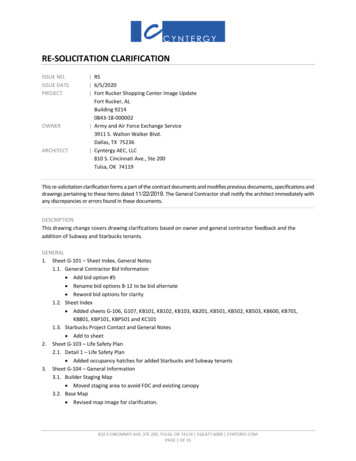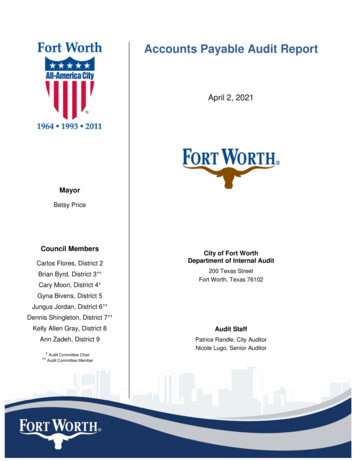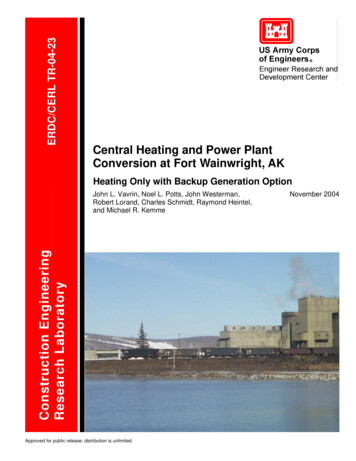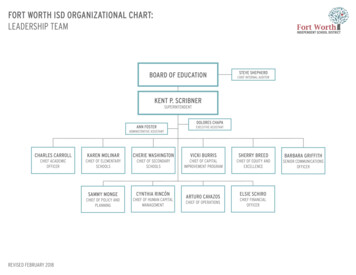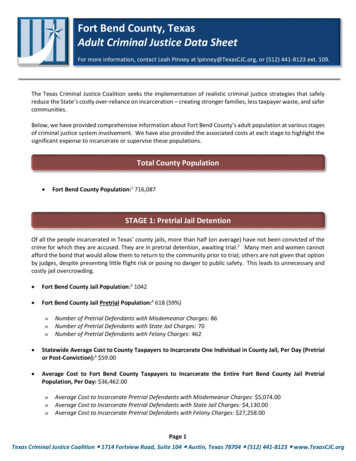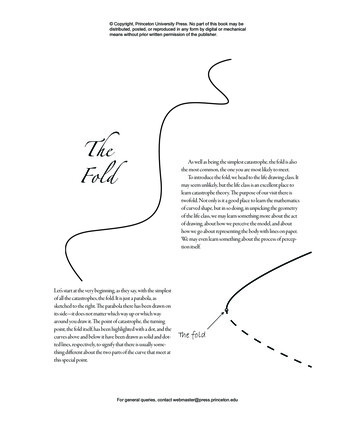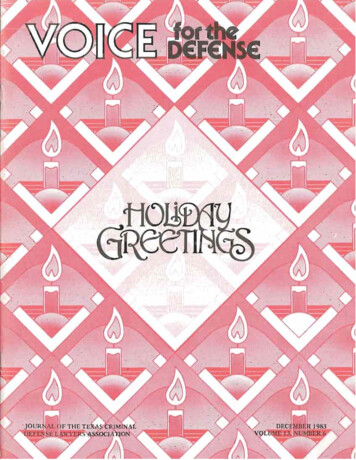
Transcription
fortMF&MJOURNAL OF THE TEXAS CRIMINAL DEFENSE LAWYERS ASSOCIATIONOFFICERSPresident: Thomas Gilbert Sharpe, Jt.BrownsvillePresident-Elect: Clifmn L. HolmesLongviewFirst VicePresident: Leuis Dugas, Jr.Oraneesecond VicePresident: Knox JonesMcAllenSecreiary-Treasurer: Charles D. ButtsSul AntonioAsst SecretaryTreasuret: Edward A. MalkttHoustonDIRECTORSRichard Alan Anderson, DallasCecil W. Bah, San AntonioDavid R. Bires, HoustonJ,A. "Jim" Bobo, OdemaJohn C. Boston, AustinMike Brown, LubbockGene W. Caldwell, TylerJ.A. "Tony" Canales, Corpus Chisti@nCaziu, San AntonioJoseph A. Connon Ut,McAnen.Gene de Bullet, lr., E m WatthM.P. “Rusty" DuncanlLI, DentolBob Esaada, Wichita FIlllsTim Evans, Fort WorthF.R. "Buckh' Files, Jr., TylerIdH. Goldstein, Saa Antonionald L. Goranson, DallasGzant U. Hapdeway, St., HoustonMqilee L. Hafmm,WncoIUchadE. Hmimn, DdhrTan E. Hemtlbill. DallasRichard Thornton, Gah. etunFred I. Tinsley, Jr., IlallnsRobert Gregnry Turncr, HoustonASSOCIATE DIRECTORSS t a Brown, A b i l aBuddy M. Diclren, ShermanRIlHahem RiversideJeremiah Handp, S m AntonioHarry R. Heard, Len&earJeffrey Hin!dq, MidlandFrank Jadwon, DaheSylvia AM Robertson, HoustonFred Kadsiguez, 8an AntonioSheldon Wesfeld, BrownsvillcDainP. Whihvmth, AastinBill Wis hk.amger,Lab-PAST PRESIDENTSFrankMaloney, Austin1971-1972C. Anthonv Friloux, Tr. Houstonla7 9i3Phil Borleson, Dallas1973-1974George E. Gdkeraon, Lubbock1974-1975C. David Evans. San Antonio1975-1976Weldon Holcomb, Tyler1976-1977Emmett Coluin, Houston1977-1978George F. Luqnette, Houston1978-1979Vincent Walket P ND, d a s1979-1980R a b a t D. Jones, Ausrin1980-1981REGULAR FEATURES.Editor's Comer. . . . . . . . . . . . . .3President's Report. . . . . . . . . . . . . . .4Signifloant Decicism Report.11-30Board of Directors Meeting. . . . . .33Thoughts from Behindthe Walls. . . .37.ARTICLESCriminal Appellate Rights of theUnited Statesby Stephen &huf . . . . . . . . . . '5Minimum Mandatory Sentencingin the Determinate SentencingRo essby Marcin G. Shein andRemrch by M. Louise Bill . . . . .8.Edit*: Stanley WeinbergLhwidBot#fordCktheime Ereore B m e tJulie HeddArch C McCdlIlI.POSTMASTER: RETURN POSTAGE GUARRANTEED. Please send address changes andbusiness correspondence tto Texas CnminnlDefense Lawyers Assocktion, 314 West 11thStreet, Suite 315, Austin, TX 78701. Phone(512) 478-2514.ARE YOU MOVING?OR, HAVE YOU MOVED?VOICE for the Defense is published monthlyby the Terns Ctiminal Defense Lawyers Associarion. All artides and other editoz4al contributions should be addres edto the Editor,Stanley Weinberg, 7509 Inwood Road, Suite300, Dabs, TX 75209. Adwrtislng inquidesand conttarts, send to h c k Dromgaolc, Artfafms Agency, P.O. Box 4574, Austin, TX78765, (512) 451-3588. A n u a lsubscriptionrate far members of the association is 10,which is induded in dues. Nonmember subsuiption- 20per year; single copy- 5.Second &ss postage paid a t Austin, Texas,ISSN 0364-2232Name01983 TEXAS CRIMINALLAWYERS ASSOCIATTONDEFENSE.Please l e t us k n o w as soon as you k n o wyour new address.Please use the form below:Old address:
Editor's CornerBefore 1983 comes to a close, an impoaant issue must be faced by TCDLAmembers for the new year.In Januaq 1984, all State Bar of Texas members will be called upon to vote ina referendum on proposed rules for thediscipline and suspension of State Barmembers.Your TCDLA officers and directors intheir last board meeting in Brownsvillein November adopted a resolution calliigon all members to study the proposedrules and vote in the upcoming referendum. In a rather pointed way, the resolution does not take any position on theproposed mlos, nor did the board wish totake any affirmative action on the proposals.Former TCDLA President Phil Burleson is not keeping silent on his feelings,by any means. In a letter to TCDLA hehas strongly suggested that the membership vote a strong NO against the proposed new disciplinary proposals, published in the October 1983 issue of theTexas Bar Journal.In a strongly worded appeal, one ofTCDLA's founders sets outthe follomngreasons for his stand:I strongly suggest that our membersvote AGAINST these proposedchanges for the following reasons:(1) Loss of local control: Thelocal Grievance Committees will become much like grand juries. TheState Bar's General Counsel and hisstaff will handle the invesbgationof complaints and will present theirfiidings to the Grievance Committees. The present procedure allowslocal attorneys to investigate complaints, and in many mstances, dismiss the complaints after informalinquiries and hearings.(2) Centmlization: The StateBar's General Counsel will be innear absolute control of accepting,investigating and prosecuting alleged grievance complaints. Oneproposed change will allow theGeneral Counsel to start an expwte investigation of an attorneywithout notice to the attorney orthe Grievance Committee. Withsuch great power to control and influence the outcome of an allegedcomplaint, the General Counsel'soffice will be subject to much abuseof such great power. We will likelyhave a "Big Brother" in Austin inour profession responsible for ourriehtlaw., ?3) to oracticeThese propused changeswill greatly expand the staff of theGeneral Counsel's Office. In addition to the General Counsel andAssistant General Counsels in Austin and their staff, it is contemplated that "branch offices" will beestablished throughout the entirestate, which will include otherflk:Assistant General Counsels, inuestigators, secretaries, rent and otheroffice overhead. This cost alwaysincreases, especially in a bureaucracy, and will be paid for by theState Bar members, either by substantial dues increases or periodicassessments.Austin will become our Washington, and we really need to avoldthat problem.Many of the proposed changesare for the better, but the aboveand other proposed changes suggestthat these changes should not beadopted. With further study and additional changes, some new changescan be made that will be worhableand fair.I urge all attorneys to study theseproposed changes (in the October1983 issue of the Bar Jownal), andI believe you will agree that weshould vote AGAINST them.The aspect of creating another"Big Brother" to keep watch over attorneys, especially with the advent ofOrwell's infamous year of 1984, oughtto give all TCDLA members pause.This may be one Bar vote that needseveryone's attention and vote.Happy holiday and a healthy andprosperous New Year, even if it is1984.EdDecember 1983/VOICEfor the Defeiise 3
President's ReportTHOMASThe proportional Sentence doctrinewhich is emerging relates to a body ofstatistics which wiU be used to determinewhether persona who committed similarcrimes received the m e sentenceas thosebefore the Court. The Supreme Court in1976 recognized and approved the lawsof the State of Georgia and Flo idawhichrequired proportionality review. Neitherthe Texas Penal Code nor the Code ofCriminal Proocedure refer to comparative4 YOICEfor the &fmse/December 1983sentence review.Tt will be simpIe for the members ofthis association to gather the styles ofcases where the original charge was for acapital crime and yet one or more of theparticipants in the event received a termof years or prohation for a sentence. Allof the plea bargain agreements that wehave eatwed into where the death penaltywas an alternate punishment may nowbecome relevant to the issue of how thesete really feels about treating peopleequal at the sentencing stage.How many of you have had a clientconvicted as a result of the testimony ofan individual who was given immunity ora short sentence? We will not know thedepth of the comparative sentence ruleuntil the Supreme Court decidesthe Harrisease. However, we should be prepared toput together a body of statisties from ourSHARPE, JR.neither recognizes nor praotices ein sentencjng mgarding capitrationale regarding lesserLaw" Committee. By the timedecislon is rendered we willnecessary documentation toCaurts on this mititical issue.
A Second Poisoned' Bite o f the A d eCRIMINAL APPELLATE RIGHTSOF THE UNITED STATESby Stephen Malouf, DallasUntil 1907,the United States had noright to appeal a trial court judgment in acriminal case. Then Congress enacted theCriminal Appeals Act1 whichgranted theGovernment the limited right to appealfrom a decision dismissing an indictmentwhere such dismissal was based upon "theinvalidity, or construction of the statuteupon which the indictment [was] founded," as well as from a decision arrestingjudgment or sustaining a motion in Bar.2The Criminal Appeals Act was amendedseveral times between 1907 and 1970,albeit none of the amendments alteredthe essential character of the Act or thescope of its coverage. In 1970, after ablemished and confused history, the Supreme Court aptly characterized the original Act as a failure "[blom of compromise, and reflecting no coherent allocation of appellate responsibility . . . amost u u l childy that [has] not improvedwith age."3 Finally, in 1970,at the Government's request, section 3731 wasamended to do away with the needlessambiguities of the statute.The amended Criminal Appeals Actpermits the government to appeal "froma decision, judgment, or order of the district court dismissing an indictment orinformationexcept that no appealshall lie where the Double Jeopardy Clauseof the United States Constitution prohibits further prosecution."4 After reviewing.the amendment, the Supreme Courtnotedthat "[tlhe end of our problems with thisAct is fmally in sight."5 The Court's optimism was due perhaps to its presumptionthat the amended Act was intended byCongress to "allow appeals [by the Government] whenever the Constitutionwould permit."e To understand the sourceof this pr@umption, it is necessarY to review the difference between the JusticeDepartment's interpretationthe Actand Congress' interpretation.The foundation of the Cou*'sPresumtion was set shortly before passage of theamended Act in 1970 by the Court's d acision in United States v. Sisson.7 In afootnote to its opinion, the Court notedits belief that the amendments "wouldallow an appeal . . . in all cases where theDouble Jeopardy Clause would permitit."E The Court's information was basedupon a representation during oral argument by then Solicitor General Erwin N.Griswold that the new amendment wouldp o w Government appeal "in all casesexcept those in which the defendant enjoys the protection of the constitutionalprohibition against double jeopardy."BGriswold's statement should be contrasted with the statement to the Senateof one of the bill's sponsors that theamendment would allow the Governmentto appeal "any ruling. . . which dismissesa prosecution. .except. .itn acquittal."lOUnder Griswold's interpretation, acquittals, mistrials, and dismissals would beappealable except to the extent forbiddenby the Double Jeopardy Clause. Underthe sponsors' interpretation, only dismissals would be appealable and then only tothe extent allowed by the Double Jeopardy Clause.The United States Supreme Court andthe united states court of for the Fifth Circuit have adopted SolicitorGeneral Griswold's interpretation that anstatutory barriers to the Government'sright to appealhave been removed.lrRather than end the debate ovk appealsby the Government, however, the Court'sconclusion that all statutory barriers toGovernment appeals had been removed"simply shifted the focus of the debatefrom issues of statutory construction tothe scope and meaning of the Double Jeopardy Clanse."l2As originally introduced by SenatorHmska, the amendment permitted Government appeals "from a decision, judgment, or order of a District Court dismissing an indictment or information or terminating a prosecution in favor of a defendant . . except that no appeal [should]lie from a judgment of acquittal."Q TheSenate bii was modified in three respectsby the Conference Committee. First, theCommittee narrowed the scope of theSenate bill by "deleting the reference to.December 1983/VOICEfor the Defense 5
orders 'terminating a prosecution in favor tion to the Vietnam War.Since the district court's decision toof a defendant.' "14 Second, since this alteration left only dismirsals appealable, dismiss was necessarily based upon factthe wording "except . from a judgment ual evide-e of Sisson's beliefs, it was aof acquittal" was deleted as surplus.j5 "directed acquittal" rather than an orderThe third change narrowed the bill still sustaining apleain bar. More importantly,further by barring Government appeals even if the acquittal could be characterfrom dismissals when prosecution after ized as an order granting a motion in bar,dismissal would violate the Double Jeo- the motion in bar provision of the Actpermitted Government appeal from onlypardy Clause.16The legislative intent and wording of such an order entered before jeopardythe statute clearly support the new that had attached. Since Sisson's "motion indismirwls only, and not acquittals, are bar" (acquittal) was sustained after jeoappealable. That is, the focus of consider- pardy had attached (the jury had beenation should be upon when prosecution impanelled), no appeal from the districtafter an order of dismissal violates the court's order sustaining the "motion inDouble Jeopardy Clause rather than upon bar" could be taken?With this background, it is necessarywhen prosecution after acquittal or dismissal violates the Double Jeopardy to determine whether the amendments ofClause. Clearly, this focus ismandated by 1970 fundamentally altered the Act tothe unequivocal wording of the statute.permit what had theretofore been imperIn 1970, the decision in UnitedStates mksible.v. Sisson made it clear that the pre-1970As noted above, pre-1970 section 3731Act did not pennit government appeal permitted Government appeals from a defrom ajudgment of acquittal entered after cision or order dismissing an indictmentor information, arresting a judgment, ora jury verdict of guilty.17The Sisson Court
Dallas Richard Thornton, Gah. etun Fred I. Tinsley, Jr., Ilallns Robert Gregnry Turncr, Houston ASSOCIATE DIRECTORS Sta Brown, Abila Buddy M. Diclren, Sherman RIlHahem Riverside Jeremiah Handp, Sm Antonio Harry R. Heard, Len&ear Jeffrey Hin!dq, Midland Frank Jadwon, Dahe Sylvia AM Robertson, Houston Fred Kadsiguez, 8an Antonio Sheldon Wesfeld, Brownsvillc DainP. Whihvmth,
